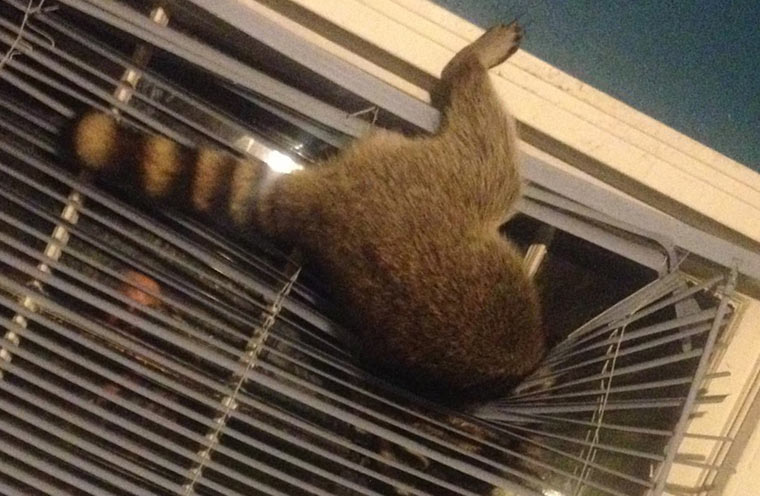- info@wildlife-removal.com
Call us for help in your town
Wildlife Removal Education
Noises Raccoons Make When They Live In Your House
Need raccoon removal in your hometown? We service over 500 USA locations! Click here to hire us in your town and check prices - updated for year 2020.
Being quite a large animal, there’s a good chance that you will hear the raccoon before you see the raccoon in your home. They’re not known for being quiet. In fact, quite the opposite. Many a homeowner have had to complain about a raccoon knocking over their garbage can in the middle of the night, having a good rummage around in the leftovers and other goodies contained within it.

The kind of noises and sounds you hear from this animal will very much depend on where it is hiding. If it is in the attic, you’ll likely hear thumping and thudding sounds. This will be the raccoon playing around, rolling around, and generally doing what nuisance wildlife does — make a nuisance of itself.
While it’s up in your attic, the raccoon will live like it would in the wild. It will create areas that it will use as latrines — tiny toilet areas. It will also create bedding and nesting spots, usually for a small family of babies either due soon or already present. The animal will make all sorts of noises creating these areas, moving around attic insulation and thumping and thudding as they shift boxes and the rest of your possessions around.
You may hear scuffling, dragging, and scratching noises too, and if the raccoon can find spaces to fit in, in the cavities of your walls, you’ll hear them literally coming from within the walls.
You will commonly hear raccoon noises around dusk and dawn. These are the times the animals leave their swellings to hunt for food. Raccoons are nocturnal creatures, so they venture out at dusk and come back to bed at dawn. It is not unheard of to see and hear raccoons out during the day, however. Food and other things are usually more than tempting enough to get them on the move.
If the animal is not inside your home, but outside it, you’ll hear a general commotion as raccoons knock over garbage cans, harass domesticated pets, and dig up the lawn in an attempt to get to the bugs beneath the surface. This will be more so the case when you have freshly watered your lawn and garden, after it has been freshly laid, and also after a good rainfall.
If we’re talking about vocal sounds, raccoons are said to have over two hundred distinct and different noises, although you probably won’t be able to make out half where near this many as you live with the nuisance wildlife in your home. These creatures are very vocal ones, and as well as chattering to each other, almost as humans would chat, they also make a wide range of other sounds. You may hear purring noises, or growling noises, hissing will usually indicate a scared or angry raccoon, and whimpering is usually a sign of a raccoon in pain. Young raccoons will howl and squeak as they call for their mothers, and they can even making a mewing sounds, often being mistaken for kittens.
With most nuisance wildlife problems, the noise of these creatures is often one of the first things to give the game away. Do not ignore weird noises coming from your attic.
Go back to the Raccoon Removal page, or learn tips to do it yourself with my How to Get Rid of Raccoons guide.


















